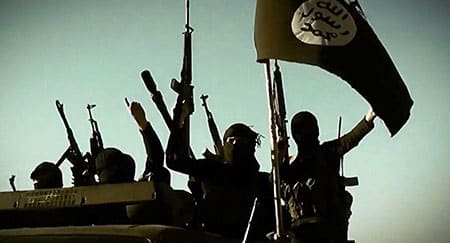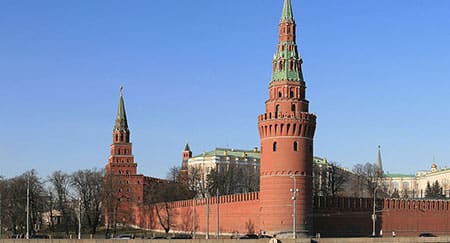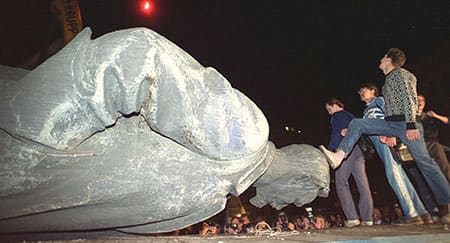Many Western observers relate ISIL (Islamic State of Iraq and the Levant) with the resurrection of medieval barbarians. But it could actually be more usefully compared with revolutionary movements of the past, notably the 1917 Bolshevik Revolution in Russia. ISIL shares with the Bolsheviks the peculiar “internationalism” that implies it could absorb people regardless of ethnicity, race or place of origin. Paradoxically, this aspect of ISIL has had positive implications for Russia.
It has served to stimulate the disintegration of Russia’s homegrown Islamists’ resistance with many members moving to the Middle East, reducing the internal threat. Moreover, it has provided Moscow with the opportunity to engage in the Middle East where – despite the Kremlin’s proclamations – its interests are only indirectly related to the fight against ISIL.
ISIL and Russian plans for the Middle East
Like the Bolsheviks, ISIL is actually anti-statist – one of the most important aspects of the revolutionary ideology. Neither built a state as it is usually understood: a structure with a strict hierarchal bureaucracy, defined geopolitical interests and, in most cases, a desire to be a part of a concert of powers. With the Bolsheviks, this came much later, after the victories in the civil war. In the early years of the revolution, the Bolsheviks were in a millenarian mood, much as we see among members of ISIL. They wanted a worldwide revolution and the creation of a worldwide utopian “republic of workers and peasants”, living in harmony and free from oppression. ISIL members, too, are not planning to create a “normal” state as it is usually understood. They do not see the ISIL state as a model of any of the present states, and their invocations of the caliphate or the early “first caliphate” are mostly a sham. Their political and social-economic models are the product of modernity more than of medieval texts. In this way they resemble past revolutionaries who also appealed to historical examples. The French Revolutionaries exalted the traditions of ancient Greece and Rome , the Bolsheviks lauded the virtues of the French Revolution. Yet the French revolutionaries were not ancient Romans, nor were the Bolsheviks French revolutionaries.
Another essential aspects of the ISIL ideology and practice is not just the appeal to the global caliphate as the point of omega but also what Bolsheviks called “internationalism”. The Bolsheviks, of course, appealed to the creeds of Marxism, while their explicit major creed was the famous slogan “Proletariat of all countries unite!” This theory implied the discarding of nationalism as a “bourgeois” ideology that separates the proletariat from each other and prevents them from being united for the final Armageddon of class struggle leading to “communism” and transcending human history.
As a matter of fact, “communism” implied a leap in different dimensions. This could also be said about the jihadists of ISIL. Their protagonists proclaim that there are no ethnic divisions, or to be precise, that ethnic/origin divisions are meaningless. Their appeal to early Islam has grounds, for the premodern people did not have a sense of ethnicity/race. Still, even in early Islam, the original backbone of Islam was basically Arab. The strong emphasis on “internationalism” –the complete disregard of ethnic background and even a sort of predisposition to foreigners – is in many ways modern, or at least has a modern spin. The Bolsheviks also welcomed foreigners.
What is the implication of this approach to Russia and how has this shaped Putin’s policy?
Outsourcing jihadists
The exodus of foreigners to ISIL-controlled territory has implications for the global community. As is the case with those who joined revolutionary movements in the past – including the Bolsheviks – there are a variety of motivations and reasons. Their numbers are considerable, from several hundred to several thousand a month. A few thousand are from the former Soviet Union. Several hundred are from Muslim Central Asia. Possibly several hundred have come from Muslim enclaves in the Russian heartland –– Tatarstan and Bashkiria. Still, the majority clearly is from the Russian North Caucasus, mainly Chechnya. And this benefits the Kremlin considerably, relieving it from the troubles that plagued both Yeltsin and Putin throughout most of post-Soviet history. Moreover, this exodus has provided Putin with the opportunity to engage in the Syrian venture without fear of possible repercussions. To understand this, one should review the history of the Kremlin’s dealing with the North Caucasus.
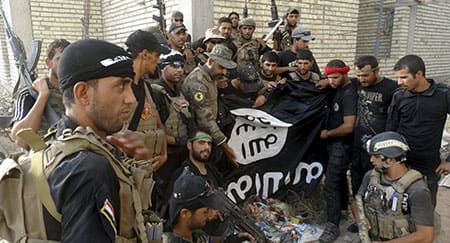
Iraqi security forces hold an Islamist State flag which they pulled down at the University of Anbar, in Anbar province July 26, 2015. Iraqi security forces entered the University of Anbar in the western city of Ramadi on Sunday and clashed with Islamic State militants inside the compound, the joint operations command said in a statement. © Reuters
The collapse of the Soviet Union stirred many minorities in the Russian Federation. Still, only in the Russian North Caucasus did the conflict take a violent turn. The first Chechen War (1994-1996) was carried out under nationalistic slogans. The Chechens were supported – directly or indirectly – by the United Stated and Turkey (the latter had quite a large Chechen diaspora). Yet, Chechen nationalism did not resonate with the numerous other ethnicities of the Caucasus and beyond. Chechens were able to achieve independence – if not de jure at least de facto – when Moscow was compelled to sign the humiliating Khasavyurt Accord in August 1996. However, neither side was satisfied with the results and, in 1999, a second Chechen war flared up. By that time, Putin understood that he would not be able to subdue Chechnya by force or, at least, that this would be a costly enterprise – so he adopted different tactics. He installed the Kadyrov clan as viceroys in Chechnya, giving them almost free reign and huge subsidies.
After 25 years, war in the Russian North Caucasus appears to have come to an end. While there is still the possibility that some jihadists return to Russia, a mass return is unlikely.
Putin’s new policies undermined the position of Chechen nationalism as an ideology of fighting. This led Dokka Umarov, the leader of the virtual Chechen state to proclaim an “emirate” in 2007, discarding Chechen nationalism and advocating Islamic “internationalism”. This approach worked, at least in the short run, attracting to Umarov’s side Muslims from all over the North Caucasus and beyond. But over time, “internationalism” increasingly became a liability for the “emirate” with growing numbers of North Caucasian fighters deciding to fight jihad –
their version of worldwide revolution – in the Middle East. This exodus increased under Umarov’s successor, Aliaskhab Kebekov. In parallel, the Kremlin conducted a continuous and relentless drive against “emirate” forces. Following the killing of Kebekov in 2015, as well as his successor, Magomed Suleimanov, who was on the job for only a few months, no new leader of the “emirate” was installed. This signified the disintegration of the North Caucasian resistance as a cohesive force and the number of terrorist attacks in the area and beyond fell sharply. After 25 years, war in the Russian North Caucasus appears to have come to an end. While there is still the possibility that some jihadists return to Russia, a mass return is unlikely.
Kremlin action in Syria and its implications
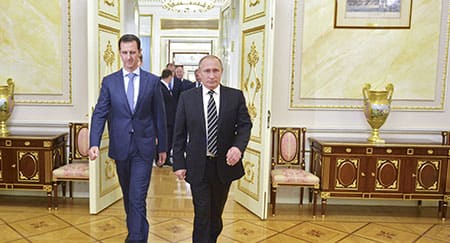
Russian President Vladimir Putin (R) and Syrian President Bashar al-Assad enter a hall during a meeting at the Kremlin in Moscow, Russia, October 20, 2015. Assad made a surprise visit to Moscow on Tuesday evening to thank Putin for launching air strikes against Islamist militants in Syria. © Reuters
The freedom from jihadist worries at home provides Putin with a free hand to engage in Syrian ventures. This is why one should take his public proclamations about Russia’s active involvement in the Syrian crisis with a grain of salt: This action is not being taken out of fear of ISIL; as outlined above, ISIL has paradoxically helped Putin by destroying the North Caucasian resistance as an organised force. Rather, Russia wants to demonstrate its arrival and relevance in the Middle East. It is a message sent not just to the United States but to a much broader audience, signaling to both the Arabs in the Middle East and to Israel that – at a time when Washington’s allies in the region are concerned that the United States appears to be wavering – Moscow could be a good back-up.
The second important aspect of the Syrian venture is the implicit appeal to Europe to readmit Russia to the West. Putin’s critics often present him as a hard-core, even irrational, Russian nationalist who wants to expand the empire at all costs and is bound for confrontation with the West, no matter the cost. This is hardly the case. Putin and the Russian elite, whose interests he represents, don’t really want to separate from Europe in a Cold War fashion – this would require a considerable sacrifice from the Russian elite and middle class. Putin’s imperial expectations are also rather limited – even in Ukraine, where Russia did not openly invade and send its armies to Kiev as many predicted. Not only would empire require considerable economic investment but western expansion would antagonise Europe and move it closer to the United States. Even Putin's increasing flirtation with China and Iran reflects a desire to show the West that Moscow has other options and is not a manifestation of a single-minded drive to embrace Asia and cut all ties with the West. Becoming closer to the West, mostly Europe, is still one of Putin's major goals – this should be taken into account when observing Putin’s actions in Syria. By engaging in Syria, Putin is trying to demonstrate to Europe that Russia could be a leading force in saving Europe and Western civilisation from the threat of violent and extremist Islamism – and that Moscow should therefore not be ostracised.
What are the practical implications for these actions? On the one hand, being basically free from fear of Islamic insurrection at home and, in many ways, benefiting from ISIL as a magnet for Russian-born extremists, Moscow is confident enough to stay in the Middle East for a long time and be assured that its interests in the region are respected. On the other, Moscow is not bound for a Cold War confrontation with any existing power and would be happy to cooperate with any powers that respect its interests. Still, one should remember that while Moscow and other capitals have their own plans in the Middle East, the actual configuration of events could be quite unexpected.

